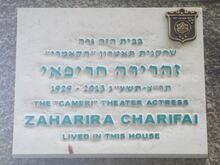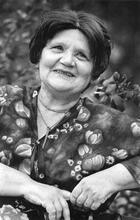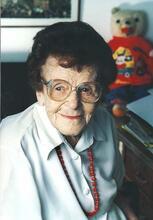Shulamit Lapid
Known for her contemporary fiction, drama, and poetry writing, Shulamit Lapid was born in Tel Aviv in 1934. Her first novel to gain popularity, Gai oni, was praised for its feminist historical fiction narrative and was the first Israeli book to be labelled “feminist.” Her Lizzie Badihi series (1989-2000) delved into the genre of spinster detective, focusing on a lower middle-class divorced journalist living in Be’er Sheva. Her later work focuses on social and feminist consciousness, with her 1998 novel Ezel Babou focusing on the lives of foreign illegal immigrant laborers in Israel. She has won many awards, including the Prime Minister’s Prize for Literature (1987), the Book Publishers Association’s Gold and Platinum Prizes for Nunia, and the Steimatzky Prize for Human Error.
Personal Life and Family
One of Israel’s best-known contemporary writers of fiction, drama, and poetry, Shulamit Lapid was born in Tel Aviv in 1934. Her father, David Giladi (1909-2009), was one of the founders of the daily Ma’ariv newspaper. She studied Middle Eastern studies and English literature at the Hebrew University of Jerusalem from 1956 to 1957 but did not complete a degree. She is the widow of journalist Joseph (Tommy) Lapid (1931-2008), who from 1999 to 2005 was a member of the Lit. "assembly." The 120-member parliament of the State of Israel.Knesset. They have a daughter, Meirav, and a son, Yair Lapid, who is an Israeli politician and journalist who serves as the Alternate Prime Minister of Israel in 2021. Their oldest daughter, Michal, was killed in a car accident in 1984.
Gai Oni and Feminist Literary Works
After several collections of short stories, Lapid first gained readers’ attention with her popular novel, Gai oni, which was the first Israeli book to be labelled “feminist.” Its feminism is, however, displaced, the action taking place in Palestine of the 1890s, thereby establishing a precedent in Israeli fiction for masking feminist protest by historical distancing. Framed in a narrative about first settlers struggling with a harsh motherland, in a culture that kept gender roles distinct and separate, Lapid’s heroine, Fania, stands out in her attempt to cross boundaries. She is both mother and merchant, venturing out on the road alone, even defending herself against armed Arab horsemen when attacked.
Yet at the end of a romance plot that borders on the melodramatic, Lapid does not allow Fania to go it alone, despite her “androgynous” qualities and her long training toward independence. This ambivalence about feminist liberation was also reflected at the time by the author’s public pronouncements: she did not consider herself a feminist, nor did she believe in “women writing” per se. At the same time, she has mostly limited herself to “women’s subjects.” Lapid modified her non-feminist position in 1987, when she participated in an international conference of women writers organized by the Israel Women’s Network and held in Jerusalem. Except for one historical novel, Ka-heres ha-nishbar (As a Broken Vessel), all Lapid’s subsequent work features female protagonists. Her first play, Rekhush natush (Abandoned Property), explored the psychological dynamics between mother and daughters in a broken family on the margins of the social system, while her second play, Rehem pundaki (Surrogate Mother), engaged the contemporary issue of surrogate mothering by deftly rewriting the biblical model (Abraham, Sarah, and Hagar). By 1989, in an interview outside Israel, this “happily married mother” (by her own admission) described herself as “small, delicate, and becoming more and more aggressive” at her “ripe fifty-four.”
Later Writings
By the end of the decade, Lapid had “resolved” her ambivalence by shifting from the “canonic” historical narrative and the female euphoric text (the romantic betrothal plot) to a different genre—the spinster detective story. In a series of popular thrillers (1989–2000), all set in a contemporary provincial town (Be’er Sheva), she has constructed a “New Israeli Woman,” a lower-middle-class journalist whose first priority is work and for whom love is divorced from matrimony. Thirty-some years old and single, Lizzie Badihi, who is proud of her “professionalism” and work ethic, is not a descendant of the “New Hebrew Woman” of the Zionist revolution (Fania and her like); rather, she is a throwback to the turn-of-the-century spinster detective of English literature. In Lapid’s version of this genre, motherhood is rejected firsthand (“I have seen my sisters,” Lizzie explains) and masculine autonomy is appropriated without any equivocation. The first novel’s final question, repeated twice, “What do you want, Lizzie?,” reads like a wry parody of Freud’s notorious question, “What does a woman want?” What this woman wants is apparently work and a new kind of romance (male-modeled, of course: no strings attached). The latter makes its appearance only at the close of the story: a tawny, handsome, rich and worldly divorcé, whose timely offered “information” rescues Lizzie from the imminent danger of losing her job. It is hard to determine whether the simplicity with which sexual difference is overcome in these plots is an indicator of naive conceptualization, or of a projection of a collective fantasy. Whatever the case, it is clear that the feminist romance produced here is an essentialist mirror image of its masculinist counterpart.
The same holds good for some of Lapid’s later short stories in which romance is replaced by aggression. A straightforward reversal of roles in a violent rape scene, for example, is the subject of “Nehitat oness” (published in English as “The Bed,” but better rendered as “Forced Entry”). The painful experience of what one might call “counter rape” is focalized through the eyes of the victim—a young man whose bewildered incomprehension is utterly ignored by his female attacker. Gender difference is again turned upside down: here the female grotesquely “redeems” her alterity by donning the dark face of masculine subjectivity, aggression.
While her earlier stories, Mazal dagim (Pisces) in 1969 and five later collections, were much more traditional, her more recent work is marked by both social and feminist consciousness, e.g. the plays mentioned above, and the 1998 novel Ezel Babou (Chez Babou), in which she tackles the painful topic, rarely addressed in Israeli literature, of foreign and mostly illegal immigrant laborers and the subhuman conditions of their work and life. Lapid has also published poems and children’s books.
In 2005 Lapid published Havat ha-almot (The Damsels’ Farm), a sequel to Gai oni, which has as its central character the daughter of Fania and Yehiel. The book deals with the Second Lit. "ascent." A "calling up" to the Torah during its reading in the synagogue.Aliyah and the hardships its members encountered. Lapid introduces into her narrative some of the historical figures of the time. Among them are the feminist pioneers Hannah Maisel, Sarah Malkhin, and Miriam Baratz.
In 2011, Lapid published Veluai Lo Hayu (Maybe They Were Not), which received the Book Publishers Association’s Gold Prize. The book is set in 1934 in a small town in Eastern Europe and is oriented around a young couple striving to start a life in Israel. It chronicles the love story of main characters Leah and Mickey through the hardships of immigration and the tumult of World War II, but it is also a declaration of love for Tel Aviv, the lively city that provided a haven for European refugees.
In 2013, Lapid published Ta’ut Enosh (Human Error), a novel about a woman named Ruth Perlmutter, a retired legendary Mossad agent. Ruth is reeled back into work upon the mysterious death of her friend and former Mossad agent Arthur. Ta’ut Enosh is more than a suspenseful mystery. It is more generally about individuals who risk their lives for their country but stray from the right path, as well as about possibilities for a new start. Lapid won the Book Publishers Association’s Gold Prize and the Steimatzsky Prize for Ta’ut Enosh. In 2014, Lapid released a collection of stories called Chalomot Shel Acherim (Dreams of Others).
In 2020, Lapid published Parpar Ba-Machsan (Butterfly in the Shed), about a successful Israeli writer, Elisha Friedrich, who discovers that his working manuscript has been stolen and published under someone else’s name. Along the way, Elisha interacts with Lapid’s other literary characters, such as Babu and Lizzy Badihi.
Critical Acclaim and Honors
From 1985 to 1987, Lapid served as the first woman elected to chair the Hebrew Writers’ Association. She has won both the Prime Minister’s Prize for Literature (1987) and the International Theater Institute Award (1988). Lapid was awarded the Book Publishers Association’s Gold and Platinum Prizes for her book Nunia, the Book Publishers Association’s Gold Prize for Maybe They Were Not (2011) and for Human’s Error (2013). She was also awarded the Steimatzky Prize for Human’s Error.
Selected Works by Shulamit Lapid
Short Stories
Mazal dagim [Pisces] (1969); Shalvat shotim [The Calm of Fools] (1974); Kadahat [Fever] (1979); Mah mesameah akavishim [Happy Spiders] (1990).
Novels
Gai oni (1982).
Ka-heres ha-nishbar (As a Broken Vessel, 1984).
Mekomon (Local Paper, 1989).
Pitui (Bait, 1992).
Hatakhshit (The Jewel, 1993).
Hol ba-enayim (Sand in your Eyes, 1997).
Ezel Babou (Chez Babou, 1998).
Pilegesh ba-giv’ah (Concubine on the Hill, 1999).
Havat ha-almot (2005).
Veulai Lo Hayu (Maybe They Were Not, 2011).
Ta’ut Enosh (Human Error, 2012).
Parpar Ba-Machsan (Butterfly in the Shed, 2020).
Novella
Ha-Safsal (The Bench, 2000).
Poetry
Shirei halon (Window Poems, 1988).
Plays
Rekhush natush (Abandoned Property, 1987).
Rehem pundaki (Surrogate Mother, 1991).
Mif’al hayyav (His Life’s Work, 1992).
Haflagot (Sailings, 1994)
For Children
Shpiz (1971).
Na’arat ha-halomot (The Girl of Dreams, 1985).
Ha-tanin Mizrayyim (Egypt the Crocodile, 1987).
Oded ha-melukhlakh (Dirty Oded, 1988).
Oreah (The Visitor, 1988).
Ha-Rabbinic ordinationsemikhah Zehavah (Zehavah the Blanket, 1998).
Feldman; Yael S. No Room of Their Own: Gender and Nation in Israeli Women’s Fiction. New York: 1999 (Hebrew edition, Tel Aviv: 2001).
From Jewish Writers of the Twentieth Century. Editor: Sorrel Kerbel. Copyright © 2003. Reproduced by permission of Routledge/Taylor and Francis Books, Inc.






